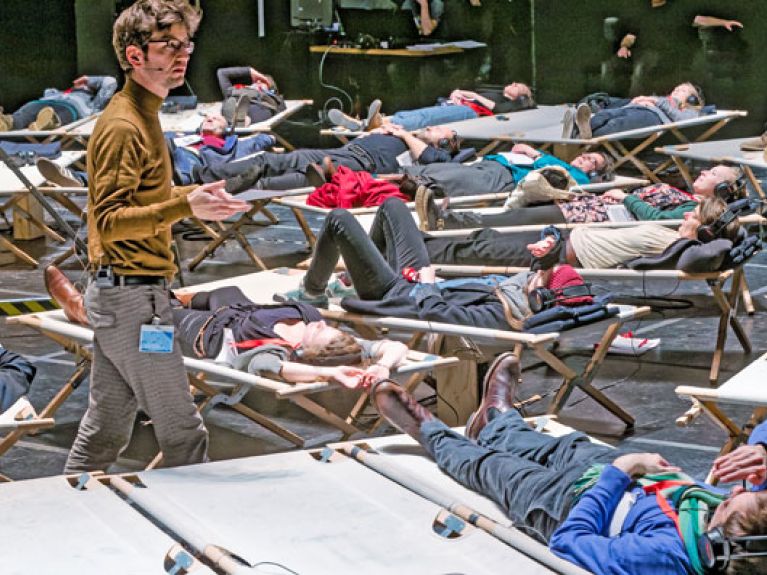Between theatre and reality
Arms trade, death and mourning, the modern working world: the Rimini-Protokoll collective integrates the performers’ authentic experiences into its productions.

Actors are experts in the realm of “as if”, slipping into the roles of other experts, for example, experts in greed for power, in the pain of love or in saving the world. They also embody these more convincingly than the experts themselves could. If the models try to represent themselves, their performance often seems unrealistic, for in the theatre the experts in real life are actually lay-people. The German-Swiss theatre collective Rimini Protokoll develop their particular stage formats out of this strange relationship between awkward reality and acted real time. Helgard Haug, Stefan Kaegi and Daniel Wetzel have been working with authentic experience since the year 2000. In the play Karl Marx: Das Kapitel, Erster Band, 2006, they processed the impressions of experts who at some point had to do professionally with that historical work. In Deadline, 2003, experts in death were the focal point, in Sabenation, 2004, former employees of the Belgian airline Sabena which had to file for bankruptcy in 2001. Because private views of the themes are expressly desired in these plays, the performers also function as authors of the piece. Only in very rare cases does this apparent excessive demand made of the theatrically inexperienced end in embarrassment. Although Rimini-Protokoll deliberately include the embarrassment of lay theatre, as it exposes the false appearance of acted out reality theatres, the collective and their courageous actors nevertheless succeed in composing diversified sequences of scenes dealing dramatically with real themes.
This problem of manipulating audiences by professionally overwhelming them, as traditional theatre usually does, is also addressed by Rimini Protokoll through the contrast provided by the lay experts. In a second format that they use regularly, the three author-directors deal with the remote control of perception by means of technical distance. Instructed by voices from headphones, the audience is guided through cities or old airports, receives commands, hears strange interpretations of the surroundings presented or is encouraged to take part in small scenes played in public. The question that always remains is whether this remote control actually represents a boon, or is an unkind way of showing up people’s self-abandonment.
Rimini Protokoll’s most complex project to date, which has been awarded numerous prizes, combines remote control and an encounter with experts in the framework of an installation on the theme of the arms trade. In a large box with various authentically-staged scenarios, the Situation Rooms (2013) of the title, the audience members with a Tablet PC in hand encounter real profiteers and victims of that violent business. In accordance with precise guidelines received from invisible instructors, the members of the audience slip into the role of security experts, shooting victims or observers of violent military excesses. This “join-in news viewing” is a shocking demonstration of the power of a whole new form of as-if theatre which Rimini Protokoll has developed over the past 15 years as an important expansion of European theatre. ▪

